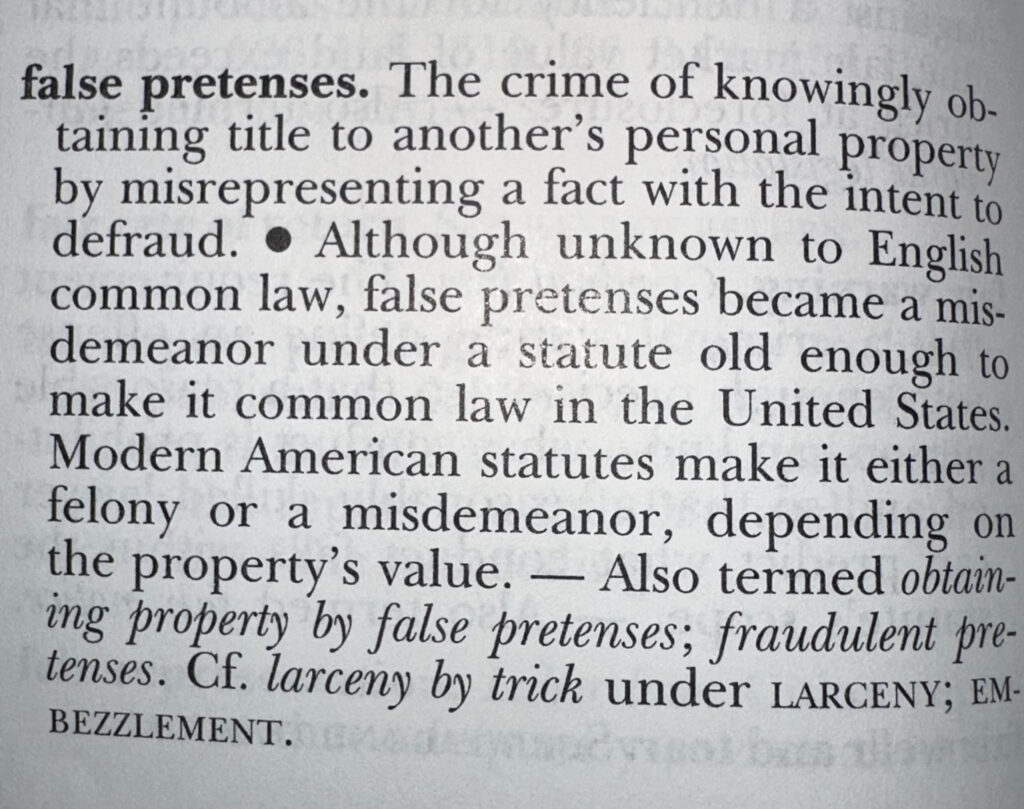” The unlawful taking and carrying away of someone else’s personal property with the intent to deprive the possessor of it permanently.”

Larceny:
“The unlawful taking and carrying away of someone else’s personal property with the intent to deprive the possessor of it permanently.”
” The unlawful taking and carrying away of someone else’s personal property with the intent to deprive the possessor of it permanently.”

“…(a) Any person subject to this chapter who wrongfully takes, obtains, or withholds, by any means, from the possession of the owner or of any other person any money, personal property, or article of value of any kind-
(1) with intent permanently to deprive or defraud another person of the use and benefit of property or to appropriate it to his own use or the use of any person other than the owner, steals that property and is guilty of larceny; or
(2) with intent temporarily to deprive or defraud another person of the use and benefit of property or to appropriate it to his own use or the use of any person other than the owner, is guilty of wrongful appropriation. …”

Text contains those laws in effect on November 2, 2024
From Title 10-ARMED FORCES Subtitle A-General Military Law PART II-PERSONNEL CHAPTER 47-UNIFORM CODE OF MILITARY JUSTICE SUB CHAPTER X-PUNITIVE ARTICLES
(a) Any person subject to this chapter who wrongfully takes, obtains, or withholds, by any means, from the possession of the owner or of any other person any money, personal property, or article of value of any kind-
(1) with intent permanently to deprive or defraud another person of the use and benefit of property or to appropriate it to his own use or the use of any person other than the owner, steals that property and is guilty of larceny; or
(2) with intent temporarily to deprive or defraud another person of the use and benefit of property or to appropriate it to his own use or the use of any person other than the owner, is guilty of wrongful appropriation.
(b) Any person found guilty of larceny or wrongful appropriation shall be punished as a court-martial may direct.
(Aug. 10, 1956, ch. 1041, 70A Stat. 73 .)
| Revised section | Source (U.S. Code) | Source (Statutes at Large) |
|---|---|---|
| 921(a)921(b) | 50:715(a).50:715(b). | May 5, 1950, ch. 169, §1 (Art. 121), 64 Stat. 140 . |
In subsection (a), the words “whatever” and “true” are omitted as surplusage. The word “it” is substituted for the words “the same” in clauses (1) and (2).
“embezzlement, n. The fraudulent taking of personal property with which one has been entrusted, esp. as a fiduciary. • The criminal intent for embezzlement — unlike larceny and false pretenses – arises after taking possession (not before or during the taking). — Also termed defalcation; peculation. See LARCENY; FALSE PRETENSES. — embez-zle, ub. — embezzler, n.”
“embezzlement, n. The fraudulent taking of personal property with which one has been entrusted, esp. as a fiduciary. • The criminal intent for embezzlement — unlike larceny and false pretenses – arises after taking possession (not before or during the taking). — Also termed defalcation; peculation. See LARCENY; FALSE PRETENSES. — embez-zle, ub. — embezzler, n.”
“false pretenses: The crime of knowingly obtaining title to another’s personal property by misrepresenting a fact with the intent to defraud. “
“false pretenses. The crime of knowingly obtaining title to another’s personal property by misrepresenting a fact with the intent to defraud. • Although unknown to English common law, false pretenses became a misdemeanor under a statute old enough to make it common law in the United States.
Modern American statutes make it either a felony or a misdemeanor, depending on the property’s value. — Also termed obtaining property by false pretenses; fraudulent pretenses. Cf. larceny by trick under LARCENY; EMBEZZLEMENT.”
